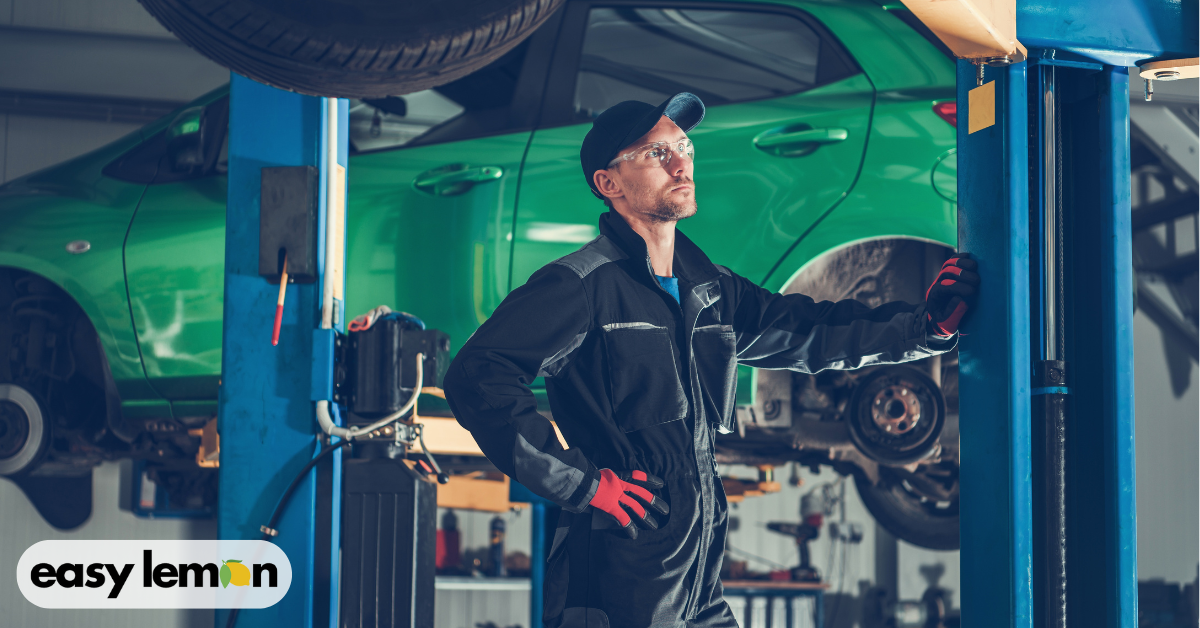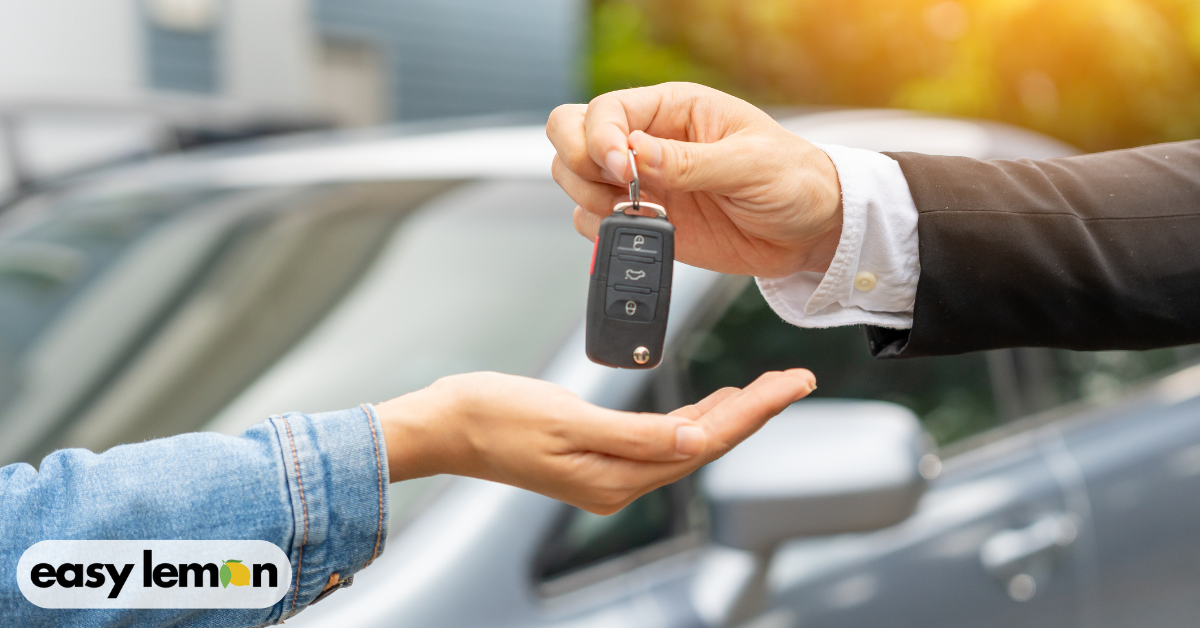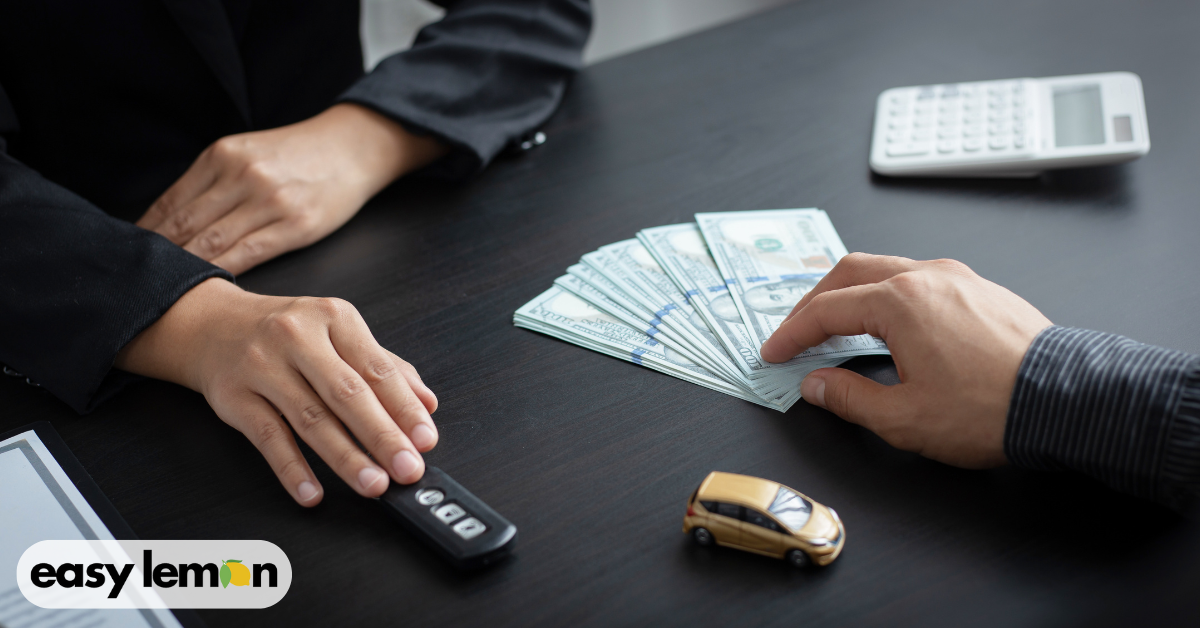A manufacturer buyback refers to the process where a car maker repurchases vehicles from owners. This is usually due to serious problems that can’t be rectified through repairs. This is a practice governed by lemon laws in the United States and similar consumer protection rules in other countries.
At Easy Lemon, our attorneys are experienced and dependable, with a 99% win rate over the last five years in lemon cases. We’ve helped our clients secure over $50 million. We can assist you in getting the refund, replacement, or cash settlement you deserve. Contact us today for a free case evaluation.
In this article, we’ll explore what a car manufacturer buyback is, how it operates under the lemon law, its purpose, and when it might be the best solution for defective vehicles.
What Is a Manufacturer Buyback?

A manufacturer buyback happens when a manufacturer buys back a car from the owner. This usually occurs because the car has a fault that can’t be fixed, even after several attempts at fixing.
Typically, lemon laws require manufacturers to either replace or repurchase a defective vehicle when it meets the legal criteria for a lemon. Hence, the buyback is a manufacturer fulfilling its legal obligation under the lemon law.
Sometimes the problem isn’t a mechanical fault. Instead, it’s the car not meeting federal or state safety and emissions standards. This buyback is different from car warranties and recalls in terms of their purposes and outcomes.
A car warranty is a contract stating a promise by the manufacturer to repair or replace faulty parts within a set time or mileage. On the other hand, a recall happens when a manufacturer brings back affected vehicles to fix safety or compliance problems.
Examples of vehicles commonly subject to buybacks are vehicles with recurring mechanical or electrical problems, safety-related faults, and emissions or regulatory compliance issues. Most buyback vehicles are branded as a lemon law buyback in their titles.
Why Do Car Manufacturers Offer Buybacks?
Car manufacturers offer buybacks for strategic, legal reasons, and positive customer relations. Lemon law buyback generally requires automakers to repurchase defective vehicles. This protects customers and helps ensure compliance with consumer protection laws.
Also, recalls and safety issues that cannot be reliable even after fix attempts could prompt a manufacturer to buy back cars. This prevents future lawsuits. It could also be used for customer satisfaction and protection of the brand’s reputation, or regulatory settlements as mandated by the government, for example, Volkswagen’s Dieselgate.
In 2015, the Environmental Protection Agency (EPA) discovered that Volkswagen used defeat devices in about 11 million diesel vehicles worldwide. This forced a large-scale lemon law buyback, and by the end of the issue, they had suffered a financial loss of over $30 billion as well as huge reputational damage.
Also, within that timeframe, General Motors admitted to a faulty ignition switch. This switch could turn off while the vehicle was running, and they had known as far back as 2001. Despite being fined 900 million dollars initially, their total expenses climbed up to $5.3 billion.
How to Know If Your Car Qualifies for a Buyback
The best way to know if your car qualifies for a buyback would be to first confirm the program its issues falls under. It could be a safety issue, an emission issue, or a state lemon law. If your vehicle repair records show that the vehicle has consistent issues and you have attempted multiple repairs without success, you may be eligible for a buyback.
Lemon laws are state-level consumer protection laws, and as such, each state sets the standard for what counts as a lemon vehicle. They also set the timeframe for how long customer complaints on such vehicles remain valid and determine the remedies. Lastly, they provide a legal pathway, as they give customers a legal route to demand a vehicle buyback.
How Does a Manufacturer Buyback Work?

An automaker may buy back your vehicle due to a recall, settlement, or state lemon law. This process follows a specific set of steps.
First, your eligibility is confirmed. If there’s a recall or settlement, you can check your vehicle identification number (VIN) on the manufacturer’s or NHTSA website.You may also get a formal notice letter. In a lemon law case, you take repair records, and if your car meets the criteria, you file a claim.
Second, is filing the buyback claim. Submit a buyback request via the manufacturer’s settlement portal, your dealership service department, or a lemon law claim in your state. You’ll need some key documents: repair records, proof of purchase or lease agreement, and registration and insurance papers.
Third, the manufacturer reviews the case to verify eligibility. After this, they may offer to fix the issue if it is repairable or purchase the vehicle from you if the issue can’t be fixed. Fourth, the buyback offer is calculated. The refund typically covers the full vehicle cost, whether leased or not. It includes taxes and fees paid at purchase, incidental expenses, and a mileage deduction for use before the first repair attempt.
Fifth is the vehicle return and payment. You return the vehicle to the dealership or settlement center, hand over the title, and sign release forms. Then, the manufacturer pays your lease if financed or pays money to you directly if you purchased the vehicle outright.
Afterward, depending on the program, the cars may be repaired and resold to other customers or scrapped. The timeline for a buyback completion in a recall or settlement is usually within 1 to 3 months, whereas for a state lemon law, it’s around 2 to 6 months.
Are Manufacturer Buyback Vehicles Reliable?
The reliability of manufacturer buyback vehicles can vary depending on why the car was repurchased. On one hand, is the nature of the defect. If it’s a minor fault, it may be permanently fixed. However, a major issue may reappear even after fixing it.
Another, is the repair quality. If the automaker redesigned or replaced the faulty part, the reliability would improve. Otherwise, if they only applied a temporary fix, problems may persist. To conclude, is disclosure and branding. In most states, manufacturer buyback vehicles must carry a title brand to warn future owners.
Manufacturer buyback vehicles are the cheapest when resold. However, buyers often prefer certified pre-owned cars for the added protection they offer. However, buyers who want peace of mind and no concerns tend to opt for new ones..
Warranty coverage for a buyback vehicle matters. It impacts the vehicle’s value and whether it’s worth keeping. There are three main types of buybacks, which are lemon law buybacks, recall buybacks, and goodwill buybacks.
When considering a buyback vehicle, it is best to check the scope of coverage, the length of said coverage, transferability, and extended warranty options. However, most lemon law buyback vehicles have at least 12-month or 12,000-mile warranty on the faulty part.
What Are the Pros and Cons of a Car Buyback?
The pros of a buyback vehicle are a lower purchase price, possible extended warranty, full disclosure on exactly what was wrong with the vehicle, and good value if it was fixed properly. The cons, however, are the title brand, risk of recurring problems, financing and insurance challenges, and limited warranty coverage. Therefore, it is safe to say that a car resold as a buyback is best when the fault was branded unfixable because it means that part has most likely been replaced.
Understanding Manufacturer Buyback Agreements
A manufacturer buyback agreement is a legal contract. In this agreement, the automaker agrees to buy back your vehicle. This happens when your car is part of a settlement program, goodwill policy, or lemon law. It specifies the buyback amount, timeline, deductions, mode of payment, and any disclosure requirements if the car is resold. The main content of a buyback agreement includes eligibility confirmation, repurchase value, lease handling, vehicle return process, timeline for completion, disclosure, and warranty.
Some tips if you are looking to purchase a buyback vehicle are to research the fault, leverage the title branding, ask for documentation, negotiate extended warranty coverage, factor in insurance challenges, and perform a thorough inspection. If you’re a manufacturer selling a vehicle, be clear about its history. Highlight any repairs and warranty. Offer incentives and price it realistically. Also, focus on buyers who care about value.
How a Car Buyback Affects Ownership and Resale

A manufacturer buyback has ripple effects on both ownership experience and resale value. Below are some of the ways it does:
- Title Branding: In many states, a buyback vehicle needs a branded title. It should say “Manufacturer Buyback,” “Lemon Law Buyback,” or “Repurchased Vehicle.” This permanently marks the car’s history, even after repairs or parts replacement.
- Disclosure Requirements: Sellers must provide a written disclosure. This should explain the fault that caused the repurchase, detail the repairs made, and specify any active warranty.
- Warranty Coverage: By law, manufacturers must provide a minimum warranty on the repaired fault, usually 12 months or 12,000 miles. However, some of them extend warranties further to reassure buyers.
- Reduced Market Value: Buyback vehicles typically sell for 10–30% less than clean-title equivalents. This depends on the type of fault, repairs, brand, and warranty offered.
- Smaller Buyer Pool: Many buyers avoid branded titles due to the risks involved in owning one. Even dealerships may reject them entirely, making it much harder to sell.
- Resale Transparency: The buyback branding and defect disclosure remain with the vehicle indefinitely. Even if the car runs perfectly, its resale will always be discounted.
Comparison with Certified Pre-Owned Programs
A manufacturer buyback vehicle is one that has been returned to the automaker under a lemon law claim or a settlement due to a defect. By contrast, a certified pre-owned vehicle is typically a trade-in vehicle that meets strict manufacturer standards and is only a few years old with somewhat low mileage. They must have clean titles, meaning no major accidents or defects.
Also, buyback vehicles undergo repairs focused on the defect that led to their return. The manufacturer must provide these details in writing. Whereas pre-owned cars go through a comprehensive, multi-point inspection and must pass strict quality standards before being certified.
Furthermore, the price point is one of the biggest differences. Buyback vehicles are much cheaper. They often sell for 20 to 30 percent less than similar clean-title cars. Pre-owned cars cost more than buybacks, but they save you money compared to new vehicles. Usually, they are about 10 to 20 percent cheaper than brand-new models.
Lastly, buyback vehicles are most appealing to buyers who want the lowest possible price and plan to keep the car without worrying about resale. Pre-owned vehicles cost more, but they offer a good mix of affordability, reliability, warranty coverage, and resale value. This makes them a safer option for buyers seeking near-new quality without the full price.
Legal Implications of Manufacturer Buybacks
To fully understand the legal implications of a buyback, you must know your rights under lemon law. When a manufacturer buys back a car, legal rules come into play. These rules protect both the previous owner and the new buyer.
First is a title change. After the car is bought back, the title is permanently marked “manufacturer buyback.” This way, no one can hide its history. Next is disclosure. If that car is ever resold, the seller must inform the new buyer in writing the reasons for the buyback and what repairs were made.
In addition are warranty rules. By law, the automaker has to give at least a short warranty on the repaired problem. Furthermore are the resale limits. Since the title is branded forever, the car will always be worth less than the market value. If a dealer or seller tries to sell it without informing the buyer, that’s illegal, and they can sue them. Lastly would be loans and insurance. Some banks won’t provide loans for buying back cars because of the branded title. Also, some insurance companies may charge higher rates.
If an automaker refuses your claim even though your car qualifies under the law, you still have several options available. To begin with, revisit the lemon law to reconfirm your claim. Then you can request arbitration, but if the arbitration fails, you can file a lawsuit. Even if your car doesn’t meet your state’s lemon law rules, the Magnuson-Moss Warranty Act still protects you. This law grants rights if the manufacturer doesn’t honor its warranty. This law can still allow you to sue for a refund, replacement, or damages.
If the manufacturer is uncooperative, you can file complaints. Reach out to your state attorney general’s office. You can also contact the Better Business Bureau if the brand is a member. Federal regulators, like the Federal Trade Commission, are another option. These complaints sometimes push the manufacturer to settle quickly.
Experienced professionals at Easy Lemon will help you understand legal steps and avoid mistakes when filing your claim or lawsuit. An attorney will also assist you in reducing the time spent creating and writing the claim. Moreover, a lawyer can represent you if your case escalates to the court.
Tips for Drivers Considering a Manufacturer Buyback

If you’re a driver considering a manufacturer buyback, you might find the following steps helpful.
- Review your state’s lemon law to determine if your vehicle qualifies.
- Keep all repair receipts and service records organized.
- Inquire whether the buyback offer includes taxes, fees, and the balance of your loan.
- Consider if a refund, replacement, or cash settlement is best for you.
- Buyback vehicles usually have a limited warranty for the repaired problems.
- Keep in mind that the resale value is generally lower for buyback cars.
If you need help or face issues with the manufacturer, think about talking to a lemon law attorney. This helps avoid common mistakes during the buyback process.
Is a Manufacturer Buyback the Best Choice for Your Car?
A manufacturer buyback happens when an automaker buys back a faulty vehicle. This can be done under lemon laws or consumer protection rules. The process ensures refunds, replacements, or settlements when repeated repairs fail. However, buyback cars carry a branded title, lower resale value, and limited warranties. Owners should check state laws, keep repair records, and think about getting legal help. This can lead to the best outcome, even if these options are affordable.
If your car keeps ending up at the shop, you don’t have to fight the manufacturer alone! Easy Lemon’s team of attorneys has helped drivers across 49 states in the last five years. Contact us for a free consultation today, and see if your car qualifies.
FAQs
What Are the Eligibility Requirements for a Buyback?
The eligibility requirements for a buyback depend on state lemon laws and the type of defect. Determinants include reasonable repair attempts, time out of service, covered defects, and proof of repairs, etc.
How Are Penalties Calculated in a Manufacturer Buyback?
Penalties are usually meant to punish the manufacturer for denying, delaying, or refusing a rightful buyback. The calculation includes attorney and court expenses, incidental damages, mileage deductions, and civil penalties.
Are There Options to Extend the Deadline for a Manufacturer Buyback?
Yes, but they are tied to state lemon laws and statutes of limitations. The options include warranty extensions, tolling, arbitration, fraud or misrepresentation by the manufacturer, and certain legal exceptions for circumstances out of your control.
Is a Buyback the Same as a Lemon?
A buyback happens when the manufacturer takes the car back from the customer. A lemon, on the other hand, is a car with a serious fault that can’t be fixed after several tries.
Should I Buy a Manufacturer Buyback Vehicle?
Purchasing a manufacturer buyback vehicle might be a smart choice if you are seeking the lowest price for a vehicle you intend to keep for a very long time. But, if you want peace of mind, a certified pre-owned or a new car is the better choice.


